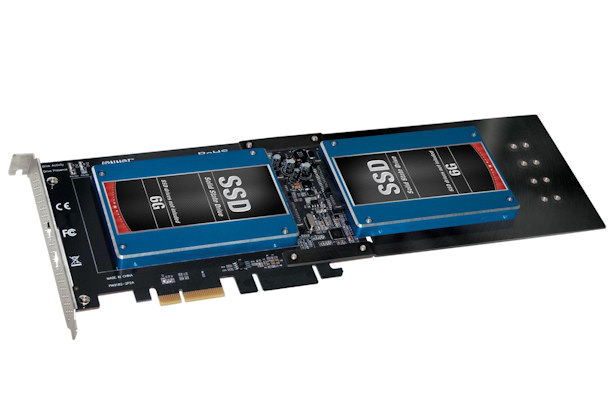Sonnet Technologies has announced the release of its 2.5″ Tempo SSD cards. The “Pro” variant will support up to two SATA 6 GB/s SSDs configured in RAID 0 in order to provide an aggregate bandwidth of up to 900MB/s while the non-pro version provides accommodations for one drive. The Tempo SSD and SSD Pro cards will be priced at 149.95 and 299.95 respectively. First availability has been stated as late August.
Now, this is the kind of product release I really like. Watch out RevoDrive, consumers now have the means to roll their own PCIe SSDs. Oh, and don’t worry, I know Sonnet tends to be strictly Mac only, but their new opus will operate just fine on PCs as well; an excellent decision by Sonnet, especially if they wish to engage as much of the market as possible. In fact, this is only the second PCIe SSD solution to be released that works with both Macs and PCs, the first being OWCs Mercury Accelsior released earlier this year. Although the card itself is a bit costly, the ability to choose your own SSD solution is, in my opinion, easily worth the price of admission, especially since Sonnet’s new products have the potential to make it through several generations of builds.
 One aspect of this release I can’t overlook, however, is the size of the Tempo SSD Pro, which looks like it may be too long for most cases to accommodate it. I have to say, it’s not often you see such a long add-in card in the storage segment, as such unwieldy dimensions are usually reserved for professional graphics or embedded CPU cards used in industrial settings, though I guess it was necessary in order to mount two SSDs. This characteristic may, however, have the unintended effect of restricting the SSD Pro to higher end markets. Ah well, such is the price of combining flexibility with high performance, something I’m sure most interested parties will fully understand.
One aspect of this release I can’t overlook, however, is the size of the Tempo SSD Pro, which looks like it may be too long for most cases to accommodate it. I have to say, it’s not often you see such a long add-in card in the storage segment, as such unwieldy dimensions are usually reserved for professional graphics or embedded CPU cards used in industrial settings, though I guess it was necessary in order to mount two SSDs. This characteristic may, however, have the unintended effect of restricting the SSD Pro to higher end markets. Ah well, such is the price of combining flexibility with high performance, something I’m sure most interested parties will fully understand.
One other point is the ability of these cards to be fitted with brackets which allow the addition of BNC connectors to facilitate the use of dual HD-SDI interfaces. According to Sonnet, this makes the Tempo line an excellent complement to Red Digital Cinema’s Red Rocket transcoding solution, which allows users to work with 4K footage in real time. Indeed, if this is intended to be the main application of Sonnet’s new cards, the 149$ starting price is an absolute steal, especially when compared to the cost of the high capacity SSDs which will no doubt be necessary when dealing with such large amounts of data. Hey, no one ever said digital cinema was easy on storage space.
 All in all, Sonnet has released an extremely unique product into the wild, the first of its kind in fact. It will be interesting to see what markets gravitate toward the new cards and the many creative uses they will no doubt find for them. With flash capacities increasing everyday now, it looks like the possibilities are endless.
All in all, Sonnet has released an extremely unique product into the wild, the first of its kind in fact. It will be interesting to see what markets gravitate toward the new cards and the many creative uses they will no doubt find for them. With flash capacities increasing everyday now, it looks like the possibilities are endless.
Press Release On Next Page…..
 The SSD Review The Worlds Dedicated SSD Education and Review Resource |
The SSD Review The Worlds Dedicated SSD Education and Review Resource | 
Something like this with mSATA SSDs would be smaller and possibly accomodate up to 4 mSATA SSDs.
lol exactly my thought, they should just have something like it, and with a good raid controller to support the 4x msata.
So what is it that makes the Tempo SSD /Pro card worth $149/$299? Because honestly, to me, it looks so like a SATA RAID HBA that can be found at much cheaper prices.
Taking a SATA RAID HBA and replacing the cable connectors with direct SATA & Power on the card itself, then adding an expensive $150 extension plate seems OTT! Or am i missing something?
Cette carte Tempo SSD est basée sur le même principe que celle vendue chez Apricorn, soit la Velocity Solo x2 Extreme Performance. C’est dommage qu’on ne puisse pas booter sur un Mac Pro avec cette Tempo SSD alors que Sonnet est généralement réputé pour être pro-Mac. 🙁
Given the weight and length I can’t imagine this will pass any kind of shock/vibe/drop test!
I don’t understand this either.
Why this instead of the Highpoint Raid? for the same price? You could hook up 8 x SSD instead.